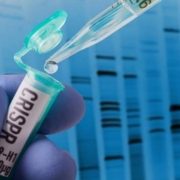Rice University researchers in Houston used the foundation of CRISPR/Cas9 technology to develop “drive-and-process” arrays, or DAP for short. The name may be simple, but the technology is complex and could be as groundbreaking as its predecessor. DAP is a mechanism that enables the editing of multiple DNA sites – rather than one at a time – to comprehensively reverse polygenic diseases resulting from multiple genetic predispositions.
According to a research collaboration among UCLA investigators and Merck KGaA, berzosertib has shown promise for Covid-19 and is also being touted for the drug’s unusually broad effect in treating a range of cancers.
Light-activated CRISPR technology edits genes more precisely and faster than the more standard chemical methods, and enables “super-fast” DNA repair, according to research from Johns Hopkins University School of Medicine.
AstraZeneca presented results for a late-stage clinical trial of Lynparza against prostate cancer, which the company hopes could lead to wider regulatory approval for more forms of the disease.
GlaxoSmithKline and AstraZeneca both reported late-stage clinical trial results that will likely make their competing medicines available to a wider group of ovarian cancer patients, possibly helping GSK catch the company’s rival in a highly contested drug class.



